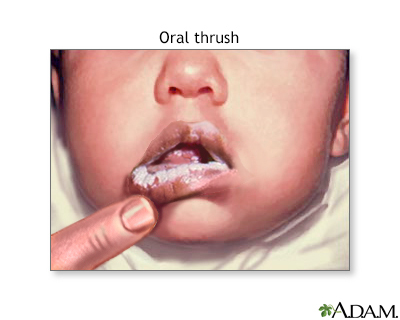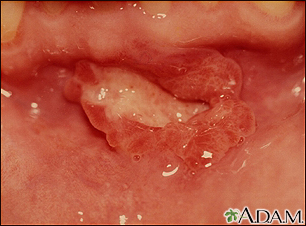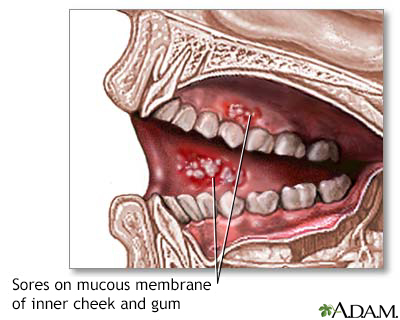Mouth ulcers
Definition
Mouth ulcers are sores or open lesions in the mouth.
Alternative Names
Oral ulcer; Stomatitis - ulcerative; Ulcer - mouth
Causes
Mouth ulcers are caused by many disorders. These include:
- Canker sores
- Gingivostomatitis
- Herpes simplex (fever blister)
- Leukoplakia
- Oral cancer
- Oral lichen planus
- Oral thrush
A skin sore caused by histoplasmosis may also appear as a mouth ulcer.
Symptoms
Symptoms will vary, based on the cause of the mouth ulcer. Symptoms may include:
- Open sores in the mouth
- Pain or discomfort in the mouth
Exams and Tests
Most of the time, a health care provider or dentist will look at the ulcer and where it is in the mouth to make the diagnosis. You may need blood tests or a biopsy of the ulcer may be needed to confirm the cause.
Treatment
The goal of treatment is to relieve symptoms.
- The underlying cause of the ulcer should be treated if it is known.
- Gently cleaning your mouth and teeth may help relieve your symptoms.
- Medicines that you rub directly on the ulcer. These include antihistamines, antacids, and corticosteroids that may help soothe discomfort.
- Avoid hot or spicy foods until the ulcer is healed.
Outlook (Prognosis)
The outcome varies depending on the cause of the ulcer. Many mouth ulcers are harmless and heal without treatment.
Some types of cancer may first appear as a mouth ulcer that does not heal.
Possible Complications
Complications may include:
- Cellulitis of the mouth, from secondary bacterial infection of ulcers
- Dental infections (tooth abscesses)
- Oral cancer
- Spread of contagious disorders to other people
When to Contact a Medical Professional
Contact your provider if:
- A mouth ulcer does not go away after 3 weeks.
- You have mouth ulcers return often, or if new symptoms develop.
Prevention
To help prevent mouth ulcers and complications from them:
- Brush your teeth at least twice a day and floss once a day.
- Get regular dental cleanings and checkups.
Gallery




References
Daniels TE, Jordan RC. Diseases of the mouth and salivary glands. In: Goldman L, Schafer AI, eds. Goldman-Cecil Medicine. 26th ed. Philadelphia, PA: Elsevier; 2020:chap 397.
James WD, Elston DM, Treat JR, Rosenbach MA, Neuhaus IM. Disorders of the mucous membranes. In: James WD, Elston DM, Treat JR, Rosenbach MA, Neuhaus IM, eds. Andrews' Diseases of the Skin: Clinical Dermatology. 13th ed. Philadelphia, PA: Elsevier; 2020:chap 34.
Pham KL, Mirowski GW. Oral disease and oral-cutaneous manifestations of gastrointestinal and liver disease. In: Feldman M, Friedman LS, Brandt LJ, eds. Sleisenger & Fordtran's Gastrointestinal and Liver Disease. 11th ed. Philadelphia, PA: Elsevier; 2021:chap 24.
Simon L, Silk H. Diseases of the mouth. In: Kellerman RD, Rakel DP, eds. Conn's Current Therapy 2021. Philadelphia, PA: Elsevier; 2021:1029-1034.
